商务英语写作教案1
- 格式:doc
- 大小:175.00 KB
- 文档页数:25
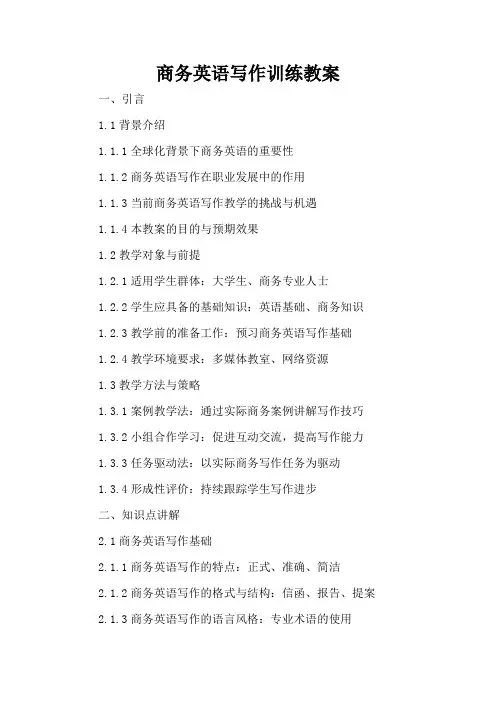
商务英语写作训练教案一、引言1.1背景介绍1.1.1全球化背景下商务英语的重要性1.1.2商务英语写作在职业发展中的作用1.1.3当前商务英语写作教学的挑战与机遇1.1.4本教案的目的与预期效果1.2教学对象与前提1.2.1适用学生群体:大学生、商务专业人士1.2.2学生应具备的基础知识:英语基础、商务知识1.2.3教学前的准备工作:预习商务英语写作基础1.2.4教学环境要求:多媒体教室、网络资源1.3教学方法与策略1.3.1案例教学法:通过实际商务案例讲解写作技巧1.3.2小组合作学习:促进互动交流,提高写作能力1.3.3任务驱动法:以实际商务写作任务为驱动1.3.4形成性评价:持续跟踪学生写作进步二、知识点讲解2.1商务英语写作基础2.1.1商务英语写作的特点:正式、准确、简洁2.1.2商务英语写作的格式与结构:信函、报告、提案2.1.3商务英语写作的语言风格:专业术语的使用2.1.4商务英语写作的常见错误及避免方法2.2商务英语写作技巧2.2.4提高商务英语写作效率的工具与资源2.3商务英语写作中的跨文化因素2.3.1不同文化背景下的商务写作差异2.3.2跨文化沟通中的语言选择与表达2.3.3国际商务写作中的文化敏感性与适应性2.3.4跨文化商务写作的案例分析三、教学内容3.1商务英语写作概述3.1.1商务英语写作的定义与重要性3.1.2商务英语写作的常见类型与用途3.1.3商务英语写作的基本原则与标准3.1.4商务英语写作的发展趋势3.2商务英语写作技能训练3.2.1商务英语写作的基本步骤与流程3.2.2商务英语写作的语言技能训练:词汇、语法、句型3.2.3商务英语写作的实战演练:模拟商务场景写作3.2.4商务英语写作的反馈与改进:同伴评审、教师指导3.3商务英语写作案例分析3.3.1成功商务英语写作案例分析3.3.2失败商务英语写作案例分析3.3.3商务英语写作中的常见问题与解决策略3.3.4商务英语写作中的创新与突破四、教学目标4.1知识目标4.1.1掌握商务英语写作的基本概念与原则4.1.2理解商务英语写作的格式与结构4.1.3了解商务英语写作中的跨文化因素4.2技能目标4.2.2能够运用商务英语写作技巧提高写作效率4.2.3能够在跨文化商务沟通中有效运用英语写作4.3情感目标4.3.1培养对商务英语写作的兴趣与热情4.3.2增强商务英语写作的自信心与自我效能感4.3.3提高跨文化商务沟通的能力与意识五、教学难点与重点5.1教学难点5.1.1商务英语写作中的专业术语与表达5.1.2商务英语写作的格式与结构规范5.1.3跨文化商务写作中的语言选择与表达5.2教学重点5.2.1商务英语写作的基本原则与标准5.2.2商务英语写作的技巧与方法5.2.3商务英语写作的实际应用与案例分析六、教具与学具准备6.1教具准备6.1.1多媒体设备:用于展示PPT、视频等教学资料6.1.2白板和马克笔:用于板书和展示关键信息6.1.3商务英语写作教材和案例集:提供写作范例和练习材料6.1.4网络资源:提供在线商务英语写作资源和练习平台6.2学具准备6.2.1笔记本电脑或平板电脑:用于在线学习和写作练习6.2.2英语字典或翻译工具:帮助理解专业术语和表达6.2.3商务英语写作指南或手册:提供写作指导和参考6.2.4自我评估表格:用于学生自我评估写作进步6.3教学环境准备6.3.1安静、舒适的学习环境:有助于集中注意力和提高学习效率6.3.2小组讨论区域:促进互动交流和合作学习6.3.3写作辅导区域:提供个别化写作指导和反馈6.3.4展示区域:展示优秀学生作品和案例分析七、教学过程7.1导入与热身7.1.1引入商务英语写作的话题和背景7.1.2通过问答或讨论激发学生的兴趣和参与度7.1.3提供一个简短的商务写作案例进行分析和讨论7.1.4引导学生思考商务写作的重要性和应用场景7.2知识讲解与示范7.2.1讲解商务英语写作的基本原则和技巧7.2.2通过案例示范商务写作的格式和结构7.2.3强调商务写作中的语言风格和专业术语的使用7.2.4引导学生分析和讨论优秀商务写作案例7.3实践与练习7.3.1分组进行商务写作练习和讨论7.3.2提供具体的商务写作任务和场景7.3.3引导学生运用所学的写作技巧和表达方式7.3.4提供个别化写作指导和反馈八、板书设计8.1知识点梳理8.1.1商务英语写作的基本概念和原则8.1.2商务英语写作的格式和结构8.1.3商务英语写作的语言风格和专业术语8.1.4商务英语写作的技巧和方法8.2教学重点与难点8.2.1商务英语写作的重点和难点梳理8.2.2商务英语写作的常见错误和解决策略8.2.3商务英语写作的实际应用和案例分析8.2.4商务英语写作的评估和反馈8.3教学过程与活动安排8.3.1导入与热身活动的设计和安排8.3.2知识讲解与示范的内容和步骤8.3.3实践与练习的任务和场景设置8.3.4板书的设计和布局九、作业设计9.1基础练习9.1.1商务英语写作的基本原则和技巧回顾9.1.2商务英语写作的格式和结构练习9.1.3商务英语写作的语言风格和专业术语应用9.1.4商务英语写作的自我评估和反思9.2案例分析9.2.1分析和讨论商务写作案例9.2.2模拟商务写作场景和任务9.2.3提供反馈和改进建议9.2.4拓展阅读和研究商务写作相关话题9.3创新与挑战9.3.2运用创新的商务写作技巧和表达方式9.3.3探索商务写作中的跨文化因素和策略9.3.4分享和展示个人商务写作成果十、课后反思及拓展延伸10.1教学效果评估10.1.1学生参与度和互动情况的分析10.1.2学生写作进步和成果的评价10.1.3教学方法和策略的有效性评估10.1.4教学目标和预期的达成情况10.2教学反思与改进10.2.1教学中的优点和不足之处10.2.2教学策略和方法的调整和改进10.2.3学生反馈和建议的收集和分析10.2.4教学资源和材料的优化和重点和难点解析在商务英语写作训练的教案中,有几个环节需要特别关注,以确保教学的有效性和学生的积极参与。
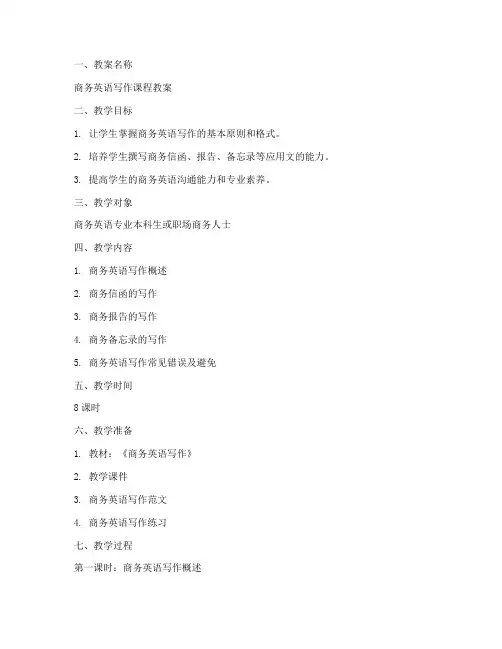
一、教案名称商务英语写作课程教案二、教学目标1. 让学生掌握商务英语写作的基本原则和格式。
2. 培养学生撰写商务信函、报告、备忘录等应用文的能力。
3. 提高学生的商务英语沟通能力和专业素养。
三、教学对象商务英语专业本科生或职场商务人士四、教学内容1. 商务英语写作概述2. 商务信函的写作3. 商务报告的写作4. 商务备忘录的写作5. 商务英语写作常见错误及避免五、教学时间8课时六、教学准备1. 教材:《商务英语写作》2. 教学课件3. 商务英语写作范文4. 商务英语写作练习七、教学过程第一课时:商务英语写作概述1. 导入:介绍商务英语写作的重要性及在职场中的应用。
2. 讲解:商务英语写作的基本原则和格式。
3. 举例:分析商务英语写作的范文,让学生了解写作规范。
4. 互动:让学生举例说明商务英语写作在实际工作中的应用场景。
第二课时:商务信函的写作1. 讲解:商务信函的种类、格式及写作技巧。
2. 举例:分析商务信函的范文,让学生掌握写作方法。
3. 练习:让学生根据所学知识,撰写一封商务信函。
第三课时:商务报告的写作1. 讲解:商务报告的种类、格式及写作技巧。
2. 举例:分析商务报告的范文,让学生了解报告写作规范。
3. 练习:让学生根据所学知识,撰写一份商务报告。
第四课时:商务备忘录的写作1. 讲解:商务备忘录的种类、格式及写作技巧。
2. 举例:分析商务备忘录的范文,让学生掌握写作方法。
3. 练习:让学生根据所学知识,撰写一份商务备忘录。
第五课时:商务英语写作常见错误及避免1. 讲解:商务英语写作中常见的错误及避免方法。
2. 举例:分析商务英语写作中的错误,让学生引以为戒。
3. 互动:让学生分享自己在商务英语写作中遇到的问题及解决方法。
第六课时:商务英语写作综合练习1. 练习:让学生结合所学知识,完成一份商务英语写作综合练习。
2. 评讲:教师对学生的练习进行点评,指出优点和不足。
第七课时:课程总结与反馈1. 总结:回顾本课程的主要内容和重点。
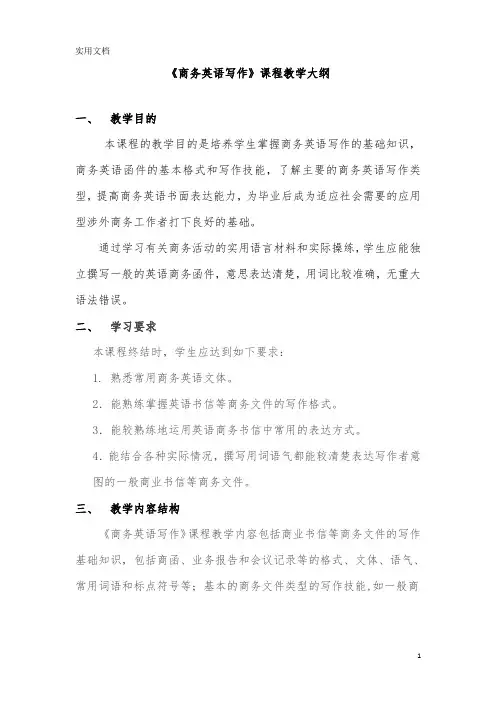
《商务英语写作》课程教学大纲一、教学目的本课程的教学目的是培养学生掌握商务英语写作的基础知识,商务英语函件的基本格式和写作技能,了解主要的商务英语写作类型,提高商务英语书面表达能力,为毕业后成为适应社会需要的应用型涉外商务工作者打下良好的基础。
通过学习有关商务活动的实用语言材料和实际操练,学生应能独立撰写一般的英语商务函件,意思表达清楚,用词比较准确,无重大语法错误。
二、学习要求本课程终结时,学生应达到如下要求:1. 熟悉常用商务英语文体。
2.能熟练掌握英语书信等商务文件的写作格式。
3.能较熟练地运用英语商务书信中常用的表达方式。
4.能结合各种实际情况,撰写用词语气都能较清楚表达写作者意图的一般商业书信等商务文件。
三、教学内容结构《商务英语写作》课程教学内容包括商业书信等商务文件的写作基础知识,包括商函、业务报告和会议记录等的格式、文体、语气、常用词语和标点符号等;基本的商务文件类型的写作技能,如一般商业函件及事务性函件包括介绍信、邀请信、祝贺信、求职信、证明信等,还有业务报告、会议记录和通告等。
要求学生在学习的过程中循序渐进,打好基础,每周学完一个Task,并完成课后练习及网上作业。
四、教学方法指导1.使用“过程体裁教学法”根据远程开放教育的特点,集中面授辅导除针对教学中的重难点适量讲解与答疑外,主要应为学生提供运用英语进行交流的机会。
辅导课以学生为中心(student-centered),教师的辅导围绕学生的活动来展开,以学习小组为单位,使用“过程体裁教学法”,结合传统教学与网络教学的优势,融合教与学两方面的内容,体现准备(范文分析)、初稿(模仿写作)、修改(互评)阶段和定稿阶段,以激发学生运用通过阅读获得的知识或信息来进行交流、表达思想情感的兴趣,同时也给学员提供相互学习,相互交流学习方法的机会。
2.重视过程学习指导网上统一安排4次形成性考核。
作业在网上平台公开互动交流,杜绝抄袭,提倡独立思考和独立完成。
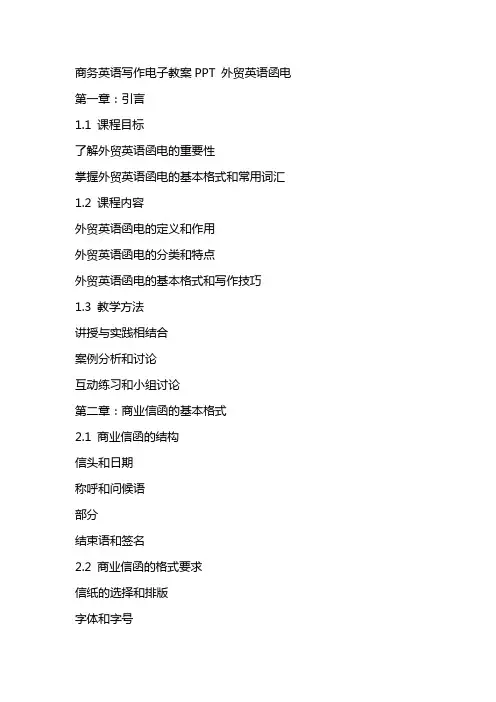
商务英语写作电子教案PPT 外贸英语函电第一章:引言1.1 课程目标了解外贸英语函电的重要性掌握外贸英语函电的基本格式和常用词汇1.2 课程内容外贸英语函电的定义和作用外贸英语函电的分类和特点外贸英语函电的基本格式和写作技巧1.3 教学方法讲授与实践相结合案例分析和讨论互动练习和小组讨论第二章:商业信函的基本格式2.1 商业信函的结构信头和日期称呼和问候语部分结束语和签名2.2 商业信函的格式要求信纸的选择和排版字体和字号段落和行间距2.3 实例分析商业邀请函商业感谢信商业投诉信第三章:商业信函的写作技巧3.1 明确目的和对象了解收信人的需求和兴趣突出重点和简洁明了3.2 使用恰当的语气和语言正式和礼貌的语言3.3 逻辑结构和连贯性清晰的段落和主题句适当的过渡词和连接词第四章:商业电子邮件的写作技巧4.1 电子邮件的格式和结构电子邮件的和称呼部分和附件4.2 电子邮件的写作技巧简洁明了的表达适当的语气和语言注意电子邮件的语气和风格4.3 实例分析商业询问电子邮件商业报价电子邮件商业确认电子邮件第五章:外贸英语函电的常用词汇和表达5.1 外贸术语和缩写EXW、FOB、CIF等Incoterms 20245.2 常用表达和短语询问和答复报价和议价付款和交货5.3 行业特定词汇和表达进出口货物运输保险和风险教学时间安排:每章内容的教学时间为2课时,共10课时。
每个章节的教学时间可以根据实际情况进行调整。
教学评估:每个章节结束后进行小组讨论和案例分析。
期末进行综合测试,包括选择题、填空题和写作题。
教学资源:PPT课件和教学资料案例分析和实例参考书籍和在线资源第六章:建立业务关系6.1 背景和目的分析建立业务关系的重要性理解建立业务关系的目的和过程6.2 建立业务关系的步骤查找潜在客户和市场调研初步接触和发送介绍信后续跟进和建立互信关系6.3 实例分析建立业务关系的介绍信跟进邮件和电话沟通达成合作的商务协议第七章:商业询盘与答复7.1 商业询盘的类型和内容了解商业询盘的种类和目的掌握商业询盘的主要内容和要素7.2 商业答复的写作技巧明确答复的格式和结构突出产品特点和优势注意事项和常见错误7.3 实例分析商业询盘的样本商业答复的样本询盘与答复的互动练习第八章:商业报价与议价8.1 报价单的组成和格式理解报价单的构成和要素掌握报价单的制作和排版8.2 报价策略和技巧分析市场需求和竞争状况制定合理的价格策略议价技巧和应对策略8.3 实例分析报价单的样本报价议价的邮件和电话沟通达成价格协议的商务谈判第九章:商业付款与交货9.1 付款方式的种类和选择了解国际贸易中的付款方式掌握信用证、TT、D/P等付款方式的优缺点9.2 交货方式和时间分析不同的交货方式和优缺点确定交货时间和地点9.3 实例分析付款方式的确认邮件交货方式和时间的协议货物运输和跟踪第十章:商业投诉与解决10.1 商业投诉的原因和类型分析商业投诉的常见原因和类型理解投诉的重要性和影响10.2 投诉处理的步骤和技巧掌握投诉处理的流程和关键环节运用有效的沟通技巧和解决方案10.3 实例分析商业投诉的信件和邮件投诉处理的回复和解决方案预防和改进措施的制定教学时间安排:每章内容的教学时间为2课时,共10课时。
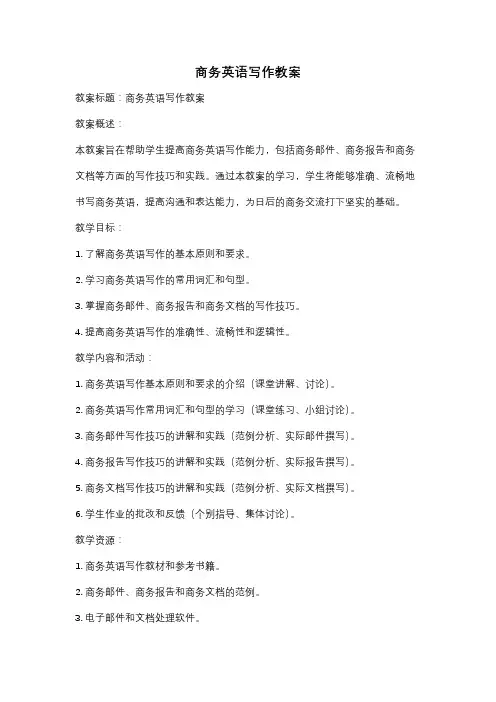
商务英语写作教案教案标题:商务英语写作教案教案概述:本教案旨在帮助学生提高商务英语写作能力,包括商务邮件、商务报告和商务文档等方面的写作技巧和实践。
通过本教案的学习,学生将能够准确、流畅地书写商务英语,提高沟通和表达能力,为日后的商务交流打下坚实的基础。
教学目标:1. 了解商务英语写作的基本原则和要求。
2. 学习商务英语写作的常用词汇和句型。
3. 掌握商务邮件、商务报告和商务文档的写作技巧。
4. 提高商务英语写作的准确性、流畅性和逻辑性。
教学内容和活动:1. 商务英语写作基本原则和要求的介绍(课堂讲解、讨论)。
2. 商务英语写作常用词汇和句型的学习(课堂练习、小组讨论)。
3. 商务邮件写作技巧的讲解和实践(范例分析、实际邮件撰写)。
4. 商务报告写作技巧的讲解和实践(范例分析、实际报告撰写)。
5. 商务文档写作技巧的讲解和实践(范例分析、实际文档撰写)。
6. 学生作业的批改和反馈(个别指导、集体讨论)。
教学资源:1. 商务英语写作教材和参考书籍。
2. 商务邮件、商务报告和商务文档的范例。
3. 电子邮件和文档处理软件。
评估方法:1. 课堂练习和小组讨论的参与度和表现评估。
2. 商务邮件、商务报告和商务文档的书写质量评估。
3. 学生作业的书写质量评估。
教学时间安排:本教案建议以10周为周期进行教学,每周2节课,每节课45分钟。
教学延伸:为了进一步提高学生的商务英语写作能力,建议学生进行实践项目,如模拟商务会议、商务谈判等,以实际应用所学知识和技巧。
同时,可鼓励学生参与商务英语写作比赛或活动,提升写作水平和自信心。
备注:本教案仅为示例,具体教学内容和活动可根据教学实际情况进行调整和修改。
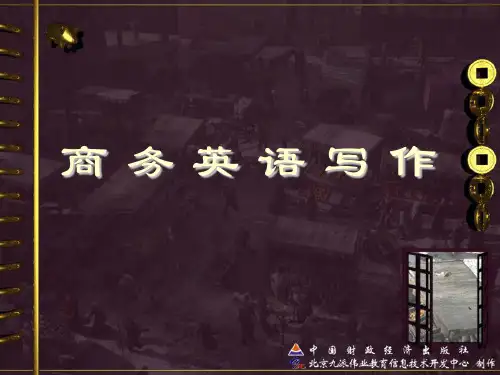
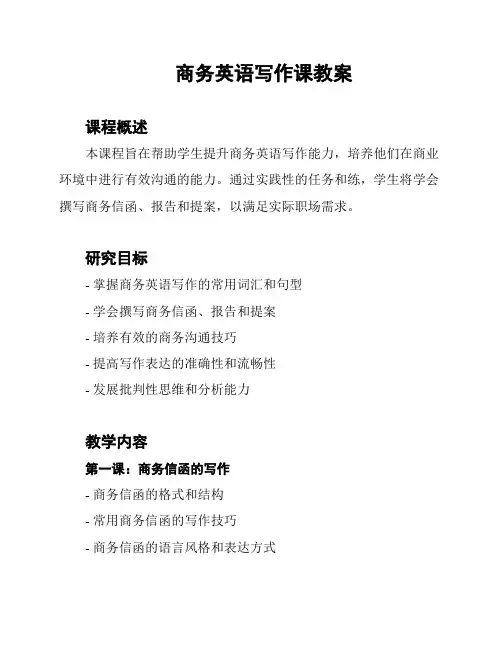
商务英语写作课教案
课程概述
本课程旨在帮助学生提升商务英语写作能力,培养他们在商业环境中进行有效沟通的能力。
通过实践性的任务和练,学生将学会撰写商务信函、报告和提案,以满足实际职场需求。
研究目标
- 掌握商务英语写作的常用词汇和句型
- 学会撰写商务信函、报告和提案
- 培养有效的商务沟通技巧
- 提高写作表达的准确性和流畅性
- 发展批判性思维和分析能力
教学内容
第一课:商务信函的写作
- 商务信函的格式和结构
- 常用商务信函的写作技巧
- 商务信函的语言风格和表达方式
第二课:商务报告的撰写
- 商务报告的类型和要求
- 商务报告的结构和布局
- 商务报告的写作技巧和注意事项
第三课:商务提案的撰写
- 商务提案的目标和目的
- 商务提案的组织结构和内容要点
- 商务提案的语言和风格要求
教学方法
- 授课讲解:介绍商务英语写作技巧和要点
- 练任务:学生完成相关写作任务,如撰写商务信函、报告和提案
- 课堂讨论:学生分享写作经验和提供互相反馈
- 作业批改:对学生的作业进行评估和指导
评估方法
- 课堂参与度:学生在课堂上积极参与讨论和练
- 作业完成度:学生按时完成指定的写作任务
- 写作质量:对学生的商务写作作业进行评估,包括语言表达、思路逻辑和结构准确性
参考资料
- 《商务英语写作教程》
- 《商务英语写作指南》
- 相关商务英语写作网站和资源。
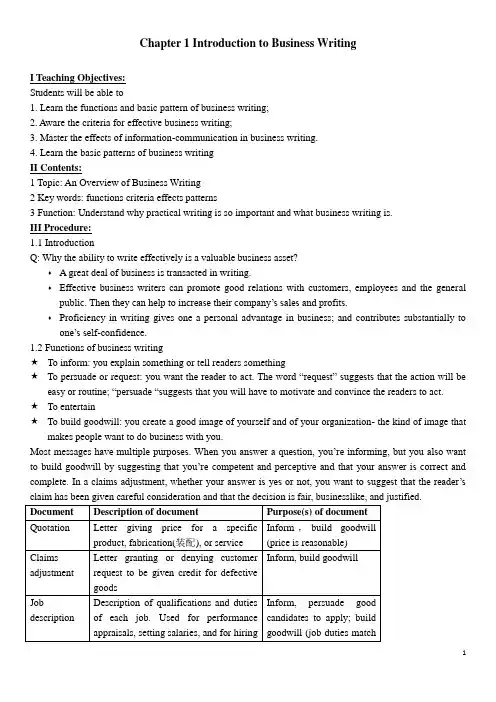
Chapter 1 Introduction to Business WritingI Teaching Objectives:Students will be able to1. Learn the functions and basic pattern of business writing;2. Aware the criteria for effective business writing;3. Master the effects of information-communication in business writing.4. Learn the basic patterns of business writingII Contents:1 Topic: An Overview of Business Writing2 Key words: functions criteria effects patterns3 Function: Understand why practical writing is so important and what business writing is.III Procedure:1.1 IntroductionQ: Why the ability to write effectively is a valuable business asset?♦ A great deal of business is transacted in writing.♦Effective business writers can promote good relations with customers, employees and the general public. Then they can help to increase their company‘s sales and profits.♦Proficiency in writing gives one a personal advantage in business; and contributes substantially to one‘s self-confidence.1.2 Functions of business writing★To inform: you explain something or tell readers something★To persuade or request: you want the reader to act. The word ―request‖ suggests that the action will be easy or routine; ―persuade ―suggests that you will have to motivate and convince the readers to act.★To entertain★To build goodwill: you create a good image of yourself and of your organization- the kind of image that makes people want to do business with you.Most messages have multiple purposes. When you answer a question, you‘re informing, but you also want to buil d goodwill by suggesting that you‘re competent and perceptive and that your answer is correct and complete. In a cla ims adjustment, whether your answer is yes or not, you want to suggest that the reader‘s claim has been given careful consideration and that the decision is fair, businesslike, and justified. Document Description of document Purpose(s) of documentQuotation Letter giving price for a specificproduct, fabrication(装配), or service Inform,build goodwill (price is reasonable)Claims adjustment Letter granting or denying customerrequest to be given credit for defectivegoodsInform, build goodwillJob description Description of qualifications and dutiesof each job. Used for performanceappraisals, setting salaries, and for hiringInform, persuade goodcandidates to apply; buildgoodwill (job duties matchlevel, pay) 10-K report Report filed with the Securities andExchange Commission (SEC) detailingfinancial information.informThank-you letter Letter to suppliers, customers, or otherpeople who have helped individuals orthe companyBuild goodwill1.3 Criteria for effective business writing (6 C‘s):♦ A successful business message: (1) the receiver interprets the msg as the sender intended it. (2) it achieves the sender‘s purposes.♦Six C‘s principles:Courtesy: treating people with respect and friendly human concern.Correctness: correct grammar, punctuation and spelling; choosing the correct level of language and using accurate information and data.Conciseness: to write in the fewest possible words without sacrificing completeness and courtesy.Clarity: short familiar words and simple short sentences are better.(your writings are totally understood) Concreteness: vivid, specific, definiteCompleteness: include all necessary information and dataBASIC FIVE CRITERIA:1. It‘s clear (Clarity). The meaning the reader gets is the meaning the writer intended. The reader doesn‘thave to guess.2. It‘s complete (Completeness). All of the reader‘s questions are answered. The reader has enoughinformation to evaluate the msg. and act on it.3. It‘s correct (Correctness). All of the information in the msg. is accurate. The msg. is free from errorsin punctuation, spelling, grammar, word order, and sentence structure.4. It saves the reader‘s time.---- (Conciseness) The style, organization, and visual impact of the msg.help the reader to read, understand, and act on the information as quickly as possible.5. It builds goodwill. The msg. presents a positive image of the writer and his or her organization. Ittreats the reader as a person, not a number. It cements [to make a relationship between people, countries, or organizations firm and strongcement a relationship/alliance]a good relationship between the writer and the reader.1.4 Adapting to modern changes in business writing (communicate effects)✧goodwill effects: It is desirable in letter[formal something that is desirable is worth having or doing]because: (1)for business reasons (2)It is the effect most of us want in our relations.✧other effects: sometimes ensure the success of business letters.(1)the techniques of persuasion(2)techniques that emphasize your qualification (3) play down the unwelcome part✧Achieving the desired effects, we can do the following:✓Conversational Style: warm and natural language✓Resisting Tendency to Be Formal: There is a misconception that big words and difficult words are preferred in business letters. They resulted in a cold and unnatural style—do not produce goodwill✓Avoiding the Old Language of Business: cold tone, formal language of law and flowery language of nobility.E.g.: Your letter of the 7th inst (-dated or fml commerce-instant (of this month));Please be advised to…;Wherein you state as per (根据) your letter;Thanking you in advance.✓You-viewpoint (you-attitude你式写法)---building goodwill: focus interest on the reader—for persuasion and for influencing people favorably—emphasize ―you‖ and ―your‖, de-emphasize ―we‖ and ―our‖—not just using second pronouns, but placing the reader in the center of things—Read your msg. over as if you were in your readers shoes. How would you feel if you received it?—avoid insincerity, obviously flattery, too chummy [friendly亲切的], avoid slang, clic hés, and ―in‖ jokes[shared by or appealing to a small group (小圈子内)分享的或感兴趣的: an in-joke一则内部笑话.].—using it for good goals.✓Accent on Positive Language: best for letter goals, put the reader in the right frame of mind; create the goodwill atmosphere.●You emphasize the positive when you:(1) Put positive information first, give it more space, or set it off visually in an indented[缩进的] list.(2) Eliminate negative words whenever possible.(3) Focus on what is possible, not what is impossible.✓Singling Out Your Reader: write for the reader‘s particular situation, and the reader gets individual treatment. ―We look forward to the possibility of sending our executives to you in the years ahead.‖✓Using the Reader‘s Names: It makes the reader feel that his/her ident ity as individual is recognized.---once or twice, not too often.✓Avoiding Anger: jeopardize goodwill—sarcasm, insult, exclamation; but when positive words have not brought desired results, negative words may be justified.1.5 Basic patterns of business writing:deductively[using the knowledge and information you have in order to understand or form an opinion about something]or inductively[using known facts to produce general principles] inductive argument是总结,归纳。
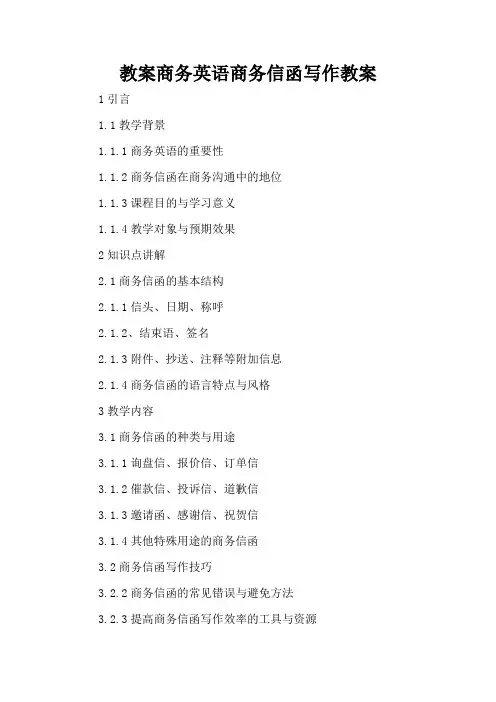
教案商务英语商务信函写作教案1引言1.1教学背景1.1.1商务英语的重要性1.1.2商务信函在商务沟通中的地位1.1.3课程目的与学习意义1.1.4教学对象与预期效果2知识点讲解2.1商务信函的基本结构2.1.1信头、日期、称呼2.1.2、结束语、签名2.1.3附件、抄送、注释等附加信息2.1.4商务信函的语言特点与风格3教学内容3.1商务信函的种类与用途3.1.1询盘信、报价信、订单信3.1.2催款信、投诉信、道歉信3.1.3邀请函、感谢信、祝贺信3.1.4其他特殊用途的商务信函3.2商务信函写作技巧3.2.2商务信函的常见错误与避免方法3.2.3提高商务信函写作效率的工具与资源3.2.4商务信函的格式与排版要求3.3实际案例分析与应用3.3.1分析经典商务信函案例3.3.3商务信函写作的反馈与改进3.3.4商务信函写作的测试与评估教案商务英语商务信函写作教案4教学目标4.1知识与技能目标4.1.1掌握商务信函的基本结构与格式4.1.2学会不同类型商务信函的写作方法4.1.3提高商务英语写作能力与沟通技巧4.2过程与方法目标4.2.1通过案例分析,理解商务信函的写作特点4.2.2通过模拟练习,提升商务信函写作的实际应用能力4.2.3通过小组讨论,增强商务沟通与团队协作能力4.2.4通过反馈与评估,不断改进商务信函写作技巧4.3情感态度与价值观目标4.3.1培养学生对商务英语写作的兴趣与热情4.3.2增强学生对商务沟通重要性的认识4.3.3培养学生严谨、专业的商务写作态度4.3.4提升学生的跨文化商务沟通意识与能力5教学难点与重点5.1教学难点5.1.1商务信函的语言风格与用词准确性5.1.2商务信函的结构布局与逻辑表达5.1.3不同类型商务信函的写作技巧与要点5.1.4商务信函写作中的常见错误与纠正方法5.2教学重点5.2.1商务信函的基本结构与格式要求5.2.2商务信函写作的核心技巧与策略5.2.3商务信函写作的实际应用与案例分析5.2.4商务信函写作的反馈与评估方法6教具与学具准备6.1教具准备6.1.1多媒体教学设备6.1.2商务信函写作教材与案例集6.1.3商务英语写作参考书籍与工具书6.1.4商务信函写作模板与范文6.2学具准备6.2.1笔记本电脑或平板电脑6.2.2商务信函写作练习本与文具6.2.3商务英语词典与翻译工具6.2.4小组讨论与互动所需的辅助材料7教学过程7.1导入与预热7.1.1通过实际商务情境引入商务信函写作主题7.1.2回顾与复习商务英语写作的基础知识7.1.3引导学生分享对商务信函写作的理解与经验7.1.4提出本节课的教学目标与学习重点7.2知识讲解与案例分析7.2.1详细讲解商务信函的基本结构与格式要求7.2.2通过案例分析,解析不同类型商务信函的写作技巧7.2.3引导学生参与讨论,深入理解商务信函的语言风格与用词7.2.4强调商务信函写作中的常见错误与避免方法7.3练习与应用7.3.1分发商务信函写作练习材料,指导学生进行模拟练习7.3.2组织小组讨论,促进学生之间的交流与协作7.3.3提供实时反馈与指导,帮助学生改进写作技巧7.4.1回顾本节课的学习内容与重点7.4.2组织学生进行商务信函写作的测试与评估7.4.3提供详细的反馈与评价,指导学生进一步改进7.4.4鼓励学生持续练习与提升商务信函写作能力教案商务英语商务信函写作教案8板书设计8.1教学内容概览8.1.1商务信函写作的步骤与要点8.1.2商务信函的结构与格式8.1.3商务信函写作的案例分析8.2重点知识讲解8.2.1商务信函的开头与结尾8.2.2商务信函的结构与内容组织8.2.3商务信函的语言风格与用词8.3教学活动安排8.3.1小组讨论与互动环节8.3.2商务信函写作练习与反馈8.3.3商务信函写作的测试与评估9作业设计9.1基础练习9.1.2分析并改写提供的商务信函案例9.1.3完成商务信函写作的语法与用词练习9.2综合应用9.2.2小组合作,进行商务信函写作的互评与反馈9.2.3搜集并分析不同类型的商务信函案例9.3拓展阅读9.3.1阅读商务英语写作相关的书籍与文章9.3.2观看商务英语写作的教学视频与讲座9.3.3参与在线商务英语写作的讨论与交流10课后反思及拓展延伸10.1教学效果评估10.1.1学生对商务信函写作的理解与掌握程度10.1.2学生在商务信函写作中的进步与存在的问题10.1.3教学方法与活动的设计效果评估10.2教学改进与拓展10.2.1针对学生的反馈与表现,调整教学策略与方法10.2.2引入更多实际商务情境,增强教学的实用性10.2.3开展商务英语写作的竞赛与交流活动,激发学生的学习兴趣重点关注环节补充说明:教学难点与重点章节(5)中的“商务信函的语言风格与用词准确性”需要重点关注。
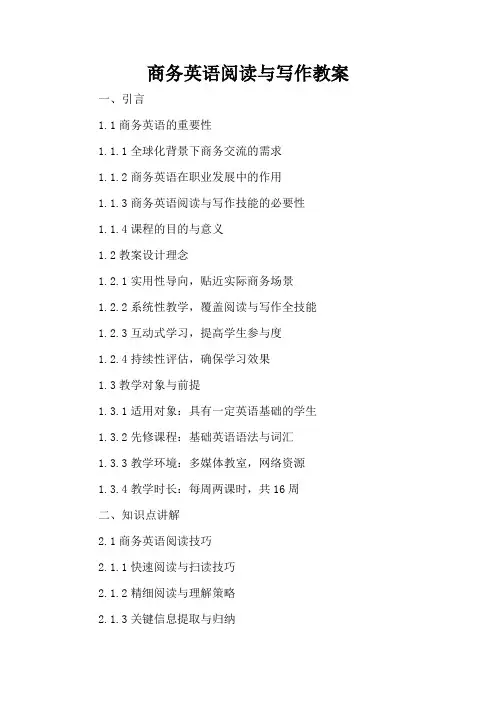
商务英语阅读与写作教案一、引言1.1商务英语的重要性1.1.1全球化背景下商务交流的需求1.1.2商务英语在职业发展中的作用1.1.3商务英语阅读与写作技能的必要性1.1.4课程的目的与意义1.2教案设计理念1.2.1实用性导向,贴近实际商务场景1.2.2系统性教学,覆盖阅读与写作全技能1.2.3互动式学习,提高学生参与度1.2.4持续性评估,确保学习效果1.3教学对象与前提1.3.1适用对象:具有一定英语基础的学生1.3.2先修课程:基础英语语法与词汇1.3.3教学环境:多媒体教室,网络资源1.3.4教学时长:每周两课时,共16周二、知识点讲解2.1商务英语阅读技巧2.1.1快速阅读与扫读技巧2.1.2精细阅读与理解策略2.1.3关键信息提取与归纳2.1.4阅读材料选择与难度匹配2.2商务英语写作基础2.2.1商务写作格式与结构2.2.2常用商务写作词汇与表达2.2.3写作逻辑与连贯性2.2.4写作风格与语气调整2.3商务案例分析2.3.1案例选择与背景介绍2.3.2案例分析与讨论方法2.3.4案例在商务英语学习中的作用三、教学内容3.1阅读材料选择3.1.1国际商务新闻报道3.1.2商务案例分析3.1.3商务合同与协议3.1.4商务信函与报告3.2写作技能培养3.2.1商务邮件写作3.2.3商务提案制作3.3实践活动设计3.3.1角色扮演与模拟商务谈判3.3.3商务英语演讲与陈述3.3.4商务英语写作比赛四、教学目标4.1知识目标4.1.1掌握商务英语阅读技巧4.1.2理解商务英语写作规范4.1.3扩展商务相关词汇与表达4.1.4了解国际商务文化差异4.2技能目标4.2.1能够高效阅读商务文本4.2.3能够进行商务沟通与交流4.2.4能够分析和解决商务问题4.3情感目标4.3.1增强商务英语学习的兴趣与自信4.3.2培养跨文化商务交流的意识4.3.3提高团队合作与沟通能力4.3.4塑造批判性思维与问题解决能力五、教学难点与重点5.1教学难点5.1.1商务英语专业词汇的理解与运用5.1.2商务文本的深度阅读与分析5.1.3商务写作的逻辑构建与风格把握5.1.4实际商务情境中的语言应用5.2教学重点5.2.1阅读技巧的系统训练与实际应用5.2.2写作技能的规范化培养与实践操作5.2.3商务文化背景知识的融入与理解5.2.4教学内容的实用性与时效性六、教具与学具准备6.1教学辅助工具6.1.1多媒体设备:用于展示PPT、视频等教学资源6.1.2白板与白板笔:用于书写关键词汇和句型6.1.3商务英语教材:提供阅读与写作素材6.1.4纸质词典与电子词典:辅助词汇查询6.2学生学习工具6.2.1笔记本与文具:记录重要信息和笔记6.2.2商务英语相关书籍:扩展阅读材料6.2.3电脑或平板电脑:用于在线学习和资料搜索6.2.4英语学习软件:如在线词典、语法检查工具6.3实践活动材料6.3.1角色扮演脚本:用于模拟商务谈判6.3.2小组讨论指南:引导有效的小组合作6.3.3商务案例分析资料:提供案例分析素材6.3.4商务写作模板:帮助学生规范写作格式七、教学过程7.1课堂导入7.1.1复习上节课内容,巩固知识点7.1.2通过提问或小测验检验学生预习情况7.1.3引入新课题,激发学生兴趣7.1.4明确学习目标,让学生了解课程重点7.2知识讲解与示范7.2.1讲解商务英语阅读技巧,举例说明7.2.2分析商务英语写作规范,展示优秀范文7.2.3通过案例分析,加深对知识点的理解7.2.4进行课堂互动,解答学生疑问7.3实践活动与小组合作7.3.1分组进行角色扮演,模拟商务谈判7.3.3学生展示,分享小组合作成果7.3.4教师点评,提供反馈与改进建议八、板书设计8.1阅读技巧板书8.1.1列出关键阅读技巧与策略8.1.2提供阅读练习示例8.1.3书写阅读材料中的难点词汇8.1.4绘制阅读理解的思维导图8.2写作技能板书8.2.1展示商务写作格式与结构8.2.2列出常用商务写作词汇与表达8.2.3示例优秀商务写作段落8.2.4强调写作中的常见错误与注意事项8.3商务案例分析板书8.3.1概述案例分析的方法与步骤8.3.2提供案例分析示例8.3.3强调案例分析中的关键点8.3.4引导学生进行案例分析讨论九、作业设计9.1阅读理解练习9.1.1选择一篇商务英语文章进行阅读9.1.2完成阅读理解题目,测试理解程度9.1.4分析文章中的商务术语与表达9.2商务写作练习9.2.2编写一份简短的商务报告9.2.3制作一份商务提案的提纲9.2.4修订之前的商务写作作业,改进错误9.3商务英语口语练习9.3.1准备一段商务英语演讲9.3.2与同学进行商务英语对话练习9.3.3录制自己的商务英语口语,自我评估9.3.4参加商务英语角或讨论会,实践交流十、课后反思及拓展延伸10.1教学效果评估10.1.1学生作业完成情况分析10.1.2学生参与课堂活动的积极性10.1.3学生对知识点的掌握程度10.1.4教学目标的达成情况10.2教学方法改进10.2.1调整教学内容的难易程度10.2.2优化教学活动的设计10.2.3提高课堂互动的有效性10.2.4引入更多实践性教学环节10.3拓展延伸活动10.3.1推荐相关商务英语阅读材料10.3.2组织商务英语写作比赛10.3.3开展商务英语角活动重点和难点解析在商务英语阅读与写作的教学过程中,有几个环节是需要特别关注的,以确保教学效果的最大化。
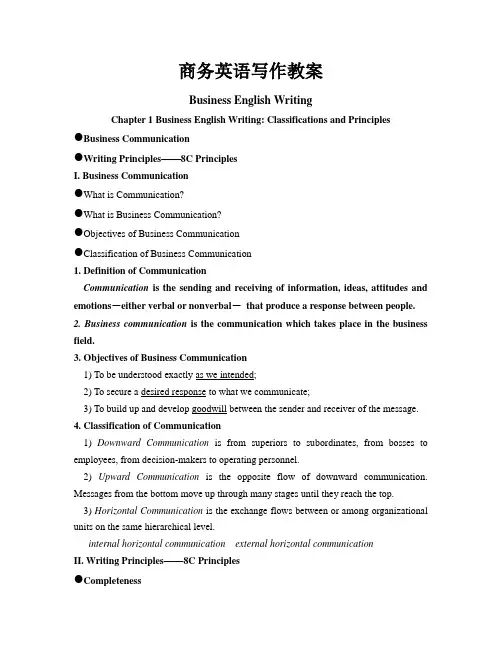
商务英语写作教案Business English WritingChapter 1 Business English Writing: Classifications and Principles●Business Communication●Writing Principles——8C PrinciplesI.Business Communication●What is Communication?●What is Business Communication?●Objectives of Business Communication●Classification of Business Communication1. Definition of CommunicationCommunication is the sending and receiving of information, ideas, attitudes and emotions―either verbal or nonverbal―that produce a response between people. 2. Business communication is the communication which takes place in the business field.3. Objectives of Business Communication1) To be understood exactly as we intended;2) To secure a desired response to what we communicate;3) To build up and develop goodwill between the sender and receiver of the message.4.Classification of Communication1) Downward Communication is from superiors to subordinates, from bosses to employees, from decision-makers to operating personnel.2) Upward Communication is the opposite flow of downward communication. Messages from the bottom move up through many stages until they reach the top.3) Horizontal Communication is the exchange flows between or among organizational units on the same hierarchical level.internal horizontal communication external horizontal communicationII. Writing Principles——8C Principles●Completeness●Concreteness●Conciseness●Clarity●Correctness●Consideration●Courtesy●Creditability1. CompletenessA complete letter should include whatever details are needed to produce the response you want.To achieve the Completeness, you should consider the following suggestions:1) Try to list all essential points in your letter;2) V olunteer something extra which, you think, may be of some use to your reader now or in the future;3) Offer alternatives you are able to give. Maybe you will get a new transaction.4) Check for the five Ws (who, what, where, when and why) and the H (how).2. Concreteness1) Use specific rather than general language to give specific information.Compare:This copier saves you both money and time.BH200 Copier makes 60 copies a minute at a cost of one fen a copy.But sometimes generalizing is necessary or preferable for being diplomatic.Compare:Our firm sells clothes for women weighing over 200 pounds.Our firm sells fashions for women with generous figures.2) Use concrete rather than abstract words when possible.Compare:I am interested in your vehicle.I am interested in your brown 1997 Ford Sedan.3. ConcisenessConciseness is saying what you want to say in the fewest words possible without sacrificing the other C qualities.1) Avoid wordy expressions and statementse.g. “I wish to take this opportunity to thank you for your sincere cooperation.”“Thank you for your sincere cooperation.”2) Avoid triteness.3) Eliminate redundancy (repetition of language elements)Mr. Li will be here at 8 A.M. in the morning.4) Leave out irrelevant materialCompare:If you had not informed us of damage so promptly, we should/would be unable to do anything for you. However, in your case, we are glad to tell you…Because you were so prompt in informing us of the damage, we are glad to tell you…4. Clarity1) Write on the level of the reader’s u nderstanding.2) Avoid ambiguityAn ambiguous word is one that has more than one meaning in the same context. Compare:The L/C must reach us for arranging shipment not later than 8 October.The L/C must reach us not later than 8 October for arranging shipment3) Avoid needless jargon (special language in one field of business)If possible, try to include examples, illustrations or other visual aids for clarity, such as pictures, diagrams, simple tables, samples and printed materials.5. CorrectnessCorrectness means a message must be united (grammatically and mechanically correct) and coherent (logically organized).To achieve this aim, the writer should:1) Use the right level of language (formal, informal, substandard).2) Include accurate facts, figures and words.3) Maintain acceptable writing mechanics or structure.6. ConsiderationConsideration means to think of the reader first and write from the “you-attitude”. “You-attitude” is a style of writing that looks at things from the reader’s poi nt of view, emphasizing what the reader wants to know, respecting the reader’s intelligence and protecting the reader’s ego (self-esteem).1) To emphasize the “you” and “your” and deemphasize the “I” and ”my” in positive situations and to avoid the word “you” in negative situations and use passive words/verbs and impersonal expressions to avoid assigning blame.Compare:We provide health insurance to all employees.You receive health insurance as a full-time P&G employee.Compare:You made no allowance for inflation in your estimate.No allowance for inflation has been made in this estimate.This estimate makes no allowance for inflation.2) To emphasize the reader’s interests rather than your own concerns.Compare:The large scale of sales of our products will make our company more profitable.You will find that our product will sell rapidly and afford you a profit margin.3) To emphasize what you can do, not what you cannot do .Compare:We won’t be able to send you the brochure this month.We will send you the brochure next month.Try to use positive words to replace negative words.Improve:We hope you won’t be dissatisfied with the new range of our electric products.4) To express your sincere desire to be of help.7. CourtesyA courteous message, like a courteous person, is polite, considerate and emphathic. Courtesy is a major contributor to goodwill. By courtesy we mean treating people with respect and friendly human concern. It can be a key factor influencing our success in the business world.1) Be polite.2) Be equal to each otherCompare:How can anyone question our ability to repay the loan when we are such a large, reputable firm?Our qualification for the loan is a well established credit rating.3) Avoid mistrustCompare:We have received your letter in which you claimed that ten tea sets were damaged in shipment.We have noticed in your letter that a damage to ten tea sets in shipment was found.4) Avoid angerCompare:You obviously made a mistake by sending me the wrong goods.Thank you for your prompt delivery. However, the goods reached us were not the ones we ordered.8. CreditabilityCreditability means being honest and fair in all our business dealings.The observation of the 7Cs will ensure the achievement of last C– Creditability. Before doing business with others, one businessman should learn how to be a man. HomeworkRead the text and answer the question:How do you analyze the 8Cs from the pragmatic perspective?Chapter 2 The Structure and Layout of a Business LetterI. StructureII. LayoutIII. HomeworkI. Structure1. Standard Parts of Business Letters2. Optional Parts of Business LettersI. Structure1. Standard Parts of the Business Letter(1) Letter-head 信头It is the heading at the top of a letter and shows where the letter comes from. It usually consists of the name, address, telephone number and fax number and also the company logo, web site, e-mail address, etc.The letter-head is usually printed on the company’s stationery.e.g. OMNICORP INTERNATIONAL17 Bunder Hill RoadShrewsbury MA 01545Tel 03-345 6788 Fax 34567(2) Date 日期The format of date differs from country to country.e.g.①Friday, 10th, March 2006;②10th (or 10) March, 2006(U.S. military, Europe, Latin America);③March 10th(or 10), 2006(American business);④10, 3, 2006 or 10/3/2006(causing confusion).(3) Inside name and address 封内姓名和地址It should duplicate the address on the envelope. It should also include the reader’sname, title and address and is placed at the left margin about 2 or 3 spaces below the date and above the salutation.(4) Salutation 称呼It is your friendly greeting to the reader and agrees with the inside address.*Gentlemen (American) / Dear Sirs (British)/ Ladies and Gentlemen (Customary Salutations to a firm)*Dear Mr. /Mrs./ Miss / Ms (marital status unknown)*Dear +first nameIt is addressed to an individual you know well.*Dear Sir & Dear MadamThey are used in formal and impersonal situations or when you do not know the reader’s name.*Dear Director (Manager, Supervisor, Owner, Department Head)Neutral titles are preferred by many office managers.*Dear CustomerIt is used for messages that omit an inside address as in sales letters or announcements to more than one person.(5) Body 主体The body is the message and the most important part. It is difficult to discuss how to write in a few words because there are many purposes of letter writing. But do remember 7C Principles.(6) Complimentary close 礼貌结束语It is a polite way of closing the letter. It must agree with the salutation in the degree of formality.*Formal 正式Dear Sir / Gentlemen ——— Faithfully yours /Yours faithfullyLadies & Gentlemen ———Yours very truly (very truly yours, your truly)—no longer popular*Semi-formal 半正式Sincerely yours or yours sincerely(very popular between businessmen who have already established a business contact with each other)Cordially yours or Very cordially yours (used when you may or may not know the reader well, but wish him to feel the relationship is friendly).*Informal 非正式Dear David ——→sincerely, cordially, best regards, take care, thanks(7) Signature 签名Every business letter must be signed. It usually includes three or four parts:①the name of the company,②the signature of the writer,③the typed name④the business title.Page 37 Examples2) Optional Parts of the Business Letter(1) Reference 参考号The reference may include a file number or departmental code or the initials of the signer of the letter to be followed by the typist’s initials.e.g. Our ref: Dep. B/4LW/PB 524;KLM: tr orTR;KL Morning—tr;K.L Morning: trK.L. Morning: TR/tr (Identification Marks) 识别标记(2) Attention Line 经办It is used to direct the letter to a specific person or department when the company name is used in the addressee line. It is usually placed between inside address and the salutation.e.g. Attention: Purchasing Manager.(3) Subject Line 事由It helps both the writer and the reader identify the subject matter,e.g. Subject: Order No. 123;Re: Invoice No. 123;(4) Enclosure Notation 附件It tells the receiver that something is included in the envelope along with the letter. It also reminds the sender and the reader of checking for enclosures.(4) Enclosure Notation 附件e.g. Enclosure: Sales Contract;Enc. 3: Sales Contract;Commercial Invoice;Bill of LadingEncl. 3Enclosures 33 Enclosures:(5) Copy Notation 抄送It indicates a copy of the letter is being used to some other business people.It is placed below the signature at the left margin.●cc: (carbon copy) xc: (Xerox copy)●pc: (photo copy) c: (copy)e.g. cc: Mr. Taylor(6) Postscript 附言When you finish the letter and happen to think of something else, you may add it at the end of the letter.P.S. (p.s.; PS): ***If there are two things, use P.P.S. But this is a poor/bad habit and should be avoided.II. Letter style (Layout)1. Indented style (缩格式/ 传统格式)Page 422. Full block form齐头式This form begins each line at the left. This is the fastest to type because typists do not have to set and use tab stops for indenting. Page 433. Modified block style改良齐头式It is currently one of the most popular styles. To most readers, this style isappealing because it achieves the best visual balance on the page.The letterhead, date, complimentary close and signature are just to the right of the center. Page 444. Modified block style with indented paragraphs 混合式(Semi-block style)Many business letters use this style. Although the full block style is widely used, the indented style is also popular, probably because its paragraphs are indented in the same way of books, newspapers and magazines. Page 45Homework1. Give the names of the parts in the letter on Page 43.2. Study the forms of envelope addressing by yourself.3. Translate the sentences into English on Page 54.Chapter 4 Credit Inquiry and Establishing Business Relations●Letters of credit inquiry●Letters of establishing business relationsI. Credit inquiry——a kind of consultancy letter●Consultancy is the business of offering specialist professional advice including market research, credit standing investigation, market trend research and other services providing business information.●Consultancy service is usually provided by banks or professional consulting companies or individuals. As a business person, you should learn to write a consultancy letter to seek needed information.●In international business, an exporter may ask his new customer to give the name of his bank(er) or the name of firms which the customer has previously dealt as a reference.●Reference:1) a piece of written information about sb’s character, ability, etc. 证明书,证明材料2) a person who provides such information. 资信证明人●There are two kinds of reference: ba nks’ (bankers’) reference—banks银行证明人and trade reference—companies商业证明人.How to Write a Consultancy Letter for Credit Standing1. The name of the company to be investigated and why you are writing to the receiver.e.g. 玛丽兰公司提出要当我公司的代理,销售我们的缝纫机,并介绍我公司向贵行了解该公司的信用、业务能力和声誉的详细情况。
商务英语课程教案第一章:商务英语基础1.1 教学目标了解商务英语的基本概念和重要性掌握商务英语的基本语法和词汇熟悉商务英语的常用表达方式和礼仪1.2 教学内容商务英语的概念和重要性商务英语的基本语法和词汇商务英语的常用表达方式和礼仪1.3 教学方法讲授法:讲解商务英语的基本概念和语法规则互动法:引导学生进行商务英语的对话练习案例分析法:分析商务英语在实际场景中的应用1.4 教学评估课堂参与度:学生参与对话练习和讨论的情况口语表达:学生进行商务英语对话的流利程度和准确性作业完成情况:学生完成相关商务英语练习的情况第二章:商务写作技巧2.1 教学目标掌握商务英语写作的基本原则和格式提高商务英语写作的准确性和专业性商务英语写作的基本原则和格式2.3 教学方法讲授法:讲解商务英语写作的基本原则和格式案例分析法:分析商务邮件和商务报告的实例实践法:学生进行商务英语写作的练习和修改2.4 教学评估语法正确性:学生写作中语法错误的数量和准确性修改能力:学生对写作练习进行修改和改进的能力第三章:商务口语交流3.1 教学目标掌握商务英语口语交流的基本技巧和表达方式学会在商务场合中进行有效的自我介绍和交流提高商务英语口语的流利程度和准确性3.2 教学内容商务英语口语交流的基本技巧和表达方式商务场合中的自我介绍和交流策略商务英语口语的常用话题和对话练习3.3 教学方法互动法:引导学生进行商务英语口语交流的练习角色扮演法:学生进行商务场合中的对话练习视听教学法:利用视频和音频材料进行商务英语口语的学习口语流利程度:学生进行商务英语口语交流的流利程度口语准确性:学生口语表达的准确性和语法正确性对话能力:学生进行商务英语对话的能力和合作情况第四章:商务谈判技巧4.1 教学目标掌握商务英语谈判的基本原则和技巧学会运用商务英语进行有效的谈判和沟通提高商务英语谈判的策略和表达能力4.2 教学内容商务英语谈判的基本原则和技巧商务谈判中的沟通策略和语言表达商务英语谈判的实战演练和案例分析4.3 教学方法讲授法:讲解商务英语谈判的基本原则和技巧角色扮演法:学生进行商务谈判的实战演练案例分析法:分析商务谈判实例和策略4.4 教学评估谈判策略:学生运用商务英语进行谈判的策略和有效性沟通能力:学生在商务谈判中的语言表达和沟通能力实战演练:学生参与商务谈判实战演练的表现和效果第五章:商务英语听力理解提高商务英语听力理解的能力和准确性学会听懂商务英语对话和演讲的基本技巧增强对商务英语听力材料的分析和理解能力5.2 教学内容商务英语听力理解的基本技巧和策略商务英语对话和演讲的特点和听力技巧商务英语听力材料的分析和理解方法5.3 教学方法视听教学法:利用视频和音频材料进行商务英语听力训练听写法:学生进行商务英语听力材料的听写和理解讨论法:学生对商务英语听力材料进行讨论和分析5.4 教学评估听力准确性:学生对商务英语听力材料的正确理解和回答情况听力技巧:学生运用听力技巧进行商务英语听力的情况和效果材料分析:学生对商务英语听力材料进行分析和理解的能力第六章:商务英语阅读理解6.1 教学目标提高商务英语阅读理解的能力和准确性学会阅读和理解商务英语文章和报告的基本技巧增强对商务英语阅读材料的分析和批判性思考能力6.2 教学内容商务英语阅读理解的基本技巧和策略商务英语文章和报告的特点和阅读技巧商务英语阅读材料的分析和批判性思考方法6.3 教学方法阅读教学法:学生阅读商务英语文章和报告并进行理解解析法:教师对商务英语阅读材料进行解析和解读批判性思考法:学生对商务英语阅读材料进行批判性思考和分析6.4 教学评估阅读准确性:学生对商务英语阅读材料的正确理解和回答情况阅读技巧:学生运用阅读技巧进行商务英语阅读的情况和效果材料分析:学生对商务英语阅读材料进行分析和批判性思考的能力第七章:商务英语翻译技巧7.1 教学目标掌握商务英语翻译的基本原则和技巧学会商务英语翻译的方法和策略提高商务英语翻译的准确性和专业性7.2 教学内容商务英语翻译的基本原则和技巧商务英语翻译的方法和策略商务英语翻译的实践练习和案例分析7.3 教学方法讲授法:讲解商务英语翻译的基本原则和技巧实践法:学生进行商务英语翻译的练习和修改案例分析法:分析商务英语翻译实例和策略7.4 教学评估翻译准确性:学生进行商务英语翻译的准确性和专业性语法正确性:学生翻译中语法错误的数量和准确性修改能力:学生对翻译练习进行修改和改进的能力第八章:商务英语口译技巧8.1 教学目标掌握商务英语口译的基本原则和技巧学会商务英语口译的方法和策略提高商务英语口译的流利程度和准确性8.2 教学内容商务英语口译的基本原则和技巧商务英语口译的方法和策略商务英语口译的实践练习和案例分析8.3 教学方法讲授法:讲解商务英语口译的基本原则和技巧实践法:学生进行商务英语口译的练习和修改案例分析法:分析商务英语口译实例和策略8.4 教学评估口译流利程度:学生进行商务英语口译的流利程度口译准确性:学生口译表达的准确性和语法正确性实战演练:学生参与商务英语口译实战演练的表现和效果第九章:商务英语与文化9.1 教学目标了解商务英语在不同文化背景下的运用和差异学会跨文化交流的技巧和策略提高在多元文化商务环境中的英语沟通能力9.2 教学内容商务英语在不同文化背景下的运用和差异跨文化交流的基本原则和技巧商务英语文化敏感性和跨文化沟通策略9.3 教学方法讲授法:讲解商务英语文化差异和跨文化交流的原则案例分析法:分析商务英语文化差异和跨文化沟通的实例互动法:学生进行跨文化交流的练习和讨论9.4 教学评估文化理解:学生对商务英语文化差异的理解和认识跨文化交流能力:学生在跨文化交流中的表现和沟通能力文化敏感性:学生对商务英语文化敏感性和跨文化沟通策略的运用10.1 教学目标提升商务英语综合运用能力和实战经验培养学生的商务英语自主学习和持续发展能力10.2 教学内容商务英语综合运用和实践能力提升商务英语自主学习和持续发展策略10.3 教学方法实践法:学生进行商务英语综合运用和实践练习讨论法:学生进行商务英语自主学习和持续发展策略的讨论10.4 教学评估综合运用能力:学生商务英语综合运用和实践能力提升的情况学习策略:学生商务英语自主学习和持续发展策略的运用情况课程反馈:学生对商务英语课程的重点和难点解析1. 教学目标的设定:确保教学目标具有可衡量性、具体性和可实现性,以指导整个教学过程。
课程名称:商务英语授课班级:财务管理专业授课教师: [教师姓名]授课时间: 2023年秋季学期教学目标:1. 培养学生对商务英语的实际应用能力,使其能够在国际商务环境中流畅地进行沟通。
2. 提高学生的商务英语写作、阅读、听力、口语和翻译能力。
3. 增强学生对商务文化、商务礼仪和国际贸易知识的了解。
教学内容:第一部分:商务英语写作教学大纲:1. 商务信函写作:介绍商务信函的基本格式、写作技巧和常见类型,如询价信、订单确认信、投诉信等。
2. 报告与提案写作:讲解如何撰写商务报告和提案,包括结构、内容和语言特点。
3. 商务邮件写作:分析商务邮件的特点和写作要点,如邮件格式、语气和内容。
教学方法:- 案例分析:通过分析真实的商务信函、报告和邮件,让学生了解不同情境下的写作规范。
- 角色扮演:让学生分组模拟商务场景,进行信函、报告和邮件的写作和交流。
- 小组讨论:引导学生讨论商务写作中的常见问题和解决方法。
教学过程:1. 导入:介绍商务英语写作的重要性,并简要回顾相关知识点。
2. 讲解:详细讲解商务信函、报告和邮件的写作技巧和格式。
3. 练习:布置相关写作练习,并组织学生进行小组讨论和角色扮演。
4. 点评:对学生的写作进行点评,并提供修改建议。
第二部分:商务英语阅读教学大纲:1. 商务新闻阅读:介绍如何快速阅读商务新闻,获取关键信息。
2. 商务报告阅读:讲解如何分析商务报告,理解报告内容和结论。
3. 商务案例阅读:分析典型的商务案例,学习解决实际问题的方法。
教学方法:- 快速阅读技巧:教授学生如何快速阅读商务材料,提高阅读效率。
- 案例分析:通过分析商务案例,提高学生对商务问题的理解和解决能力。
- 小组讨论:引导学生讨论商务阅读中的难点和重点。
教学过程:1. 导入:介绍商务英语阅读的重要性,并简要回顾相关知识点。
2. 讲解:详细讲解商务新闻、报告和案例的阅读技巧。
3. 练习:布置相关阅读练习,并组织学生进行小组讨论。
Unit 1 OverviewTeaching Material:the lesson is from Advanced Business English Writing, unit 1 overview.Teaching Audience:The fourth year college students of English major Teaching Objectives:1.To enable students to know the course2.To enable students to know the functions of business correspondence3.To enable students to know the criteria for effective business writing4.To get students to master the words and tone in business writingTeaching Procedures:Step 1: GreetingsIntroducing myself and my teaching plan, and inviting students to make self-introduction. By doing so,students can get more chances to practice their spoken English and their ability to organize their language.Step 2 warming-upBefore the lesson, I will arouse the students’ interests by showing some pictures about different business writing. And invite students to guess what categories of business letters they belong to, and then encourage them to describe the functions of different kinds of business letters.Step 3discussingThis part mainly discussed four questions:Q1: What are the functions of business correspondence?To retain a permanent record; To provide a basis for discussion; To clarify a complex subject;To send the same message to a number of peopleQ2: what is the criteria for effective business writing?Q3:what are the appropriate words and tone in business writing? Sincerity;clarity; Brevity;Step 4 introducing the unique importance of e-mails and faxes1.Introduce the importance of e-mails and the major elements of an e-mailmessage2.Introduce the importance of faxes and a few guidelines for preparing faxes. Step 5 summary and homework1.finish the exercises in the book2.Preview the new lesson.。
沈阳大学科技工程学院教案2011 ~2012 学年第 2学期课程名称:商务英语写作教师所在院、系:工商管理学生所在专业、班级: 10人资教师姓名:刘淑伟教师职称:讲师“商务英语写作”课程综述本课程的主要内容:本课程以商务英语写作技巧和能力训练为主要内容,把商务工作中可能遇到的各种写作任务融为一体,突出商务写作的特点,强调通俗易懂、简明完整、清楚正确的写作风格和原则,并尽量反映英美国家商务写作方面的最新内容。
本门课分为5大模块:商务英语写作基础、招聘与就业、企业办公管理、企业宣传和企业对外交流等,涵盖了商务基本写作类型,涉及到常用的备忘录写作、电子邮件、企业宣传、商务演讲和商务报告写作等,并有针对性的讲解简历,求职信及商业演讲等内容,将写作知识、写作技能与实际的业务活动有机结合,为学生提供了大量的写作范本,写作技巧和实战训练机会。
为了激发学生自主学习的积极性和加强学生实际应用能力的训练,本课程的每个单元设有4个板块:Having a Clear Picture(摸清门道)、Showing Your Talent Slightly (初露锋芒)、Opening the Treasure Box (打开百宝箱)、Displaying Your Prowess Fully (大显身手)。
课程以课堂讲授法和课堂训练法为主,辅以案例分析法,讲练结合,各个教学环节注重介绍写作的各种语境处理技巧,并结合课堂实践重点进行分析,加强学生的语言解析力。
能有效地提高学生商务英语写作能力。
本课程与其他课程的关系:商务英语写作课程的先修课程为英语专业基础课程和国际贸易实务、人力资源管理等相关专业课程,后续课程为经贸英语翻译等课程。
本课程总学时(学分)数:总学时48学时,学分3分。
本课程的考核方式:无期末考试总成绩构成(1)上交项目作业(每堂课根据情况选择抽交),包括电子版和纸质版,5次,每个占总分比例10%,合计占50%。
Unit OneⅠ. Teaching Objectives1.Let the students have a good understanding of business writing specifications andrequirements.2.Enable the students to enumerate the major steps of writhing process.Ⅱ. Teaching Difficulties1. The definition of some major terms and concepts related to business writing.EG: Expressive writingCommunicative writingBusiness writing2. Some techniques that are useful to solve possible writing problems.Ⅲ. Teaching MethodsDiscuss & TeachingⅣ. Teaching Periods4 periodsV. Teaching Content(1)The importance of business writing1. cost of poor communicationDifficult to read;Waste the reader’s time;May not produce the desired result2. benefits of good communicationSave time;Increase confidence;Increase efficiency and effectiveness;Build goodwill(2) Art of writing1. Purpose of the writer⊙expressive writing⊙communicative writing2. Style & Manner of writing⊙clarity⊙plain style⊙concision⊙rhetoric(3) Aspects of business writing(4) Business writing process1. planning2. researching3. organizing4. composing5. revising6. editing and proofreadingⅥ. Teaching AssignmentsKeys to In-class Exercise1T 2F 3T 4T 5T 6F 7T 8F 9T 10F 11F 12T 13F 14T 15T 16T 17T 18F 19T 20T Keys to After-class Exercise1.Expressive writing –Expressive writing is mainly concerned with academiclearning. It is personal and informal, employed to encourage comprehension and reflection on the part of the writer. Open-ended and creative, expressive writing isa good way to start learning about a topic. The process of writing –a restlesscycle of inquiry, composition, and revision – pushes students and learners toward the true goals of higher education: critical thinking, creativity, analysis, synthesis, and informed judgment. In this view, then, writing is primarily about thinking and learning, not showing off what you already know. If a writing task teaches you nothing, assignment has been a failure.municative writing–By contrast, communicative writing is analytic,formal and more or less impersonal. It presupposes that the writer already has considerable knowledge and understanding of the topic, and is writing to inform or to persuade a reader. It demands adherence to established conventions of tone, voice, diction, evidence, and citation; these conventions will vary according to discipline and type (e.g. memo, E-mail, business report, plan, and proposal, lab report, history paper, legal brief). Writers communicate their thoughts to others in writing via proper application of methods of Persuading and Informing.3.Business–According to the lexical definitions, the term of business coversoperations of all organizations, not just confined to the commercial organizations.Every organization or every business transaction (or dealing) requires communication –a phone call, meeting, letter, memo, oral presentation, formal report, contract, complaint or claim –and the success of the business dealings depends on the effectiveness of the oral and written communications. One of the clichés in business is that nothing happens until somebody sells something.Communication is central in business because it is central in life: it establishes relationships, and makes human organization possible.4.Business writing –It goes without saying that “business”covers an extremelybroad spectrum of entities and activities, and you probably also aware, at least intuitively, that “business writing”covers an equally broad spectrum of organizations and business activities. Therefore, when we talk about “business writing,” we’re talking about a great many different things. In other word, nobody reads business documents or writings for pleasure. Business writing differs from other writings in the following features:➢Purposeful–It solves problems, conveys information, calls for actions, records events and so on;➢Transactional (result-oriented) – Each writing or document must accomplish one specific task. If not, the writing is meaningless;➢Reader-oriented -- It focuses on the receiver, not the sender;➢Dynamic–Business writers are writing in the dynamic and changing business environments; and➢Economical – Time is money, and resources are limited. We must make full use of them, including time.5.Writing process –The writing process consists of series of steps (of planning,research, organization, composition, revision, editing & proofreading) carried out to complete a writing job in a definite order. It provides a framework to learn about business writing. Since writing is a recursive rather than linear business activities, it compels us to realize that writing is an ongoing, dynamic process.Indeed, a piece of writing is never really finished –it’s merely delivered to a deadline.Unit TwoⅠ. Teaching Objectives1.Let the students learn what resumes are, and how to formulate a quality resumefor themselves;2.Let the students study what resume cover letters are, and how to projectthemselves right in the right content format;3.Examine how to formulate other employment-related letters.Ⅱ. Teaching Difficultiesmon resume formats2.Essential contents of resumes3.The writing of Thank-you letter, Job rejection letter, Job acceptance letter andResignation letter.Ⅲ. Teaching MethodsTeaching & Writing PracticeⅣ. Teaching Periods6 periodsⅤ. Teaching Content(1) Resume Writing1. The definition of resumeA resume is a brief summary of one’s life history or the main events of his/her life, and gives a brief, factual summary of your qualifications beginning with the writer’s birth and listing his/her education background, work experience, professional accomplishments and hobbies.A shorter and more generic definition of resume is: resumes are the sum total of the reasons you give a prospective employer to hire you.2. Different meanings of the terms⊙Bio DataIt is a document containing the history of one’s professional and academic career, skills and goal sets.⊙The difference between a Curriculum Vita and a Resume3. Common Resume Formats⊙Chronological Resume⊙Functional Resume⊙Combination Resume⊙Targeted Resume4. Five primary goals of good resumeCut the clutterCatch the eyeSell your skillDirect the reader your wayGet you to the next step5. Essential Contents of a Resume⊙Identification (Personal Data)⊙Objective⊙Qualifications⊙Work experience⊙Achievements⊙Publications⊙References(2) Resume Cover Letter Writing1. The definition of a resume cover letterA resume cover letter introduces your resume and covers points that the resume does not. It is a well-written outline, with a brief summary of who you are and what you are doing, and what you want to do for the prospective employer.2. Types of Resume Cover Letter3. Content Format of a Resume CoverFirst Paragraph——Why you are writingMiddle Paragraph——What you have to offerConcluding Paragraph——How you will follow up(3) Other letters concerning employment1. Follow-up Letter2. Thank-you Letter3. Job Rejection Letter4. Job Acceptance Letter5. Resignation Letter6. Farewell LetterⅥ.Teaching AssignmentsKeys to In-class Exercise1F 2T 3T 4T 5T 6F 7F 8T 9T 10T11F 12T 13T 14T 15T 16T 17T 18T 19T 20TKeys to After-class Exercisemon resume formats –p.212.Essential contents of a resume - p.223.Resume objectives - p.234.Types of resume covering letters - p.255.Content format of a resume cover - p.266.Five important tips for writing a good cover letter p.27Ⅶ. Supplementary MaterialsUseful expressions related to resume cover letter writing:(1) Reference to advertisement1. I am writing in response to the position you advertised in the Nov. 9 issue of China Daily.2. I am interested in the post you advertised in yesterday’s China Daily.3. I am submitting my resume in response to your advertisement which was issued in Nov. 9.4. I should like to apply for the position of which you advertised in the Nov. 9 issue of China Daily.5. I read your advertisement …… with interest.6. I noted your advertisement for ….. in …..7. Your advertisement in ……. Seems a good match for my qualifications/ credentials/ background…8. I should very much like to be considered for the post of which was advertised in……9. I see from your advertisement in …… that ……10. The job which you described in your advertisement in the Nov. 9 issue of China Daily is one for which I think I can show you some excellent qualifications.11. I am looking for a job as ……, and would be grateful if you would consider me for such a post in your firm/ company./ university/ institute12. I am writing to inquiry about possible position as ……, my colleague/supervisor/friend……, suggested I contact you.(2) Brief summary of qualifications or credentials (with reference to position requirements)1.I am a graduate of …… with a degree in ……2.As you can see from my resume, I hold a degree in ……3.My qualifications include…..4.My strength is in ……(3) Enclosure explanation1.Please find enclosed my resume, which highlights…..2.Please review the enclosed resume.3.The enclosed resume will provide you with ……4.Enclosed is my resume which contains details of …..(4) Salary expectations (optional)1. My salary expectations are in the range between …and …2. My compensation requirements are in the $ … to $...(5) Request for response or contact information1.Thank you for your time and consideration, and I look forward to hearing fromyou shortly.2.I appreciate your consideration, and I look forward to the opportunity to have aninterview.3.Thank you for taking the time to review my resume.4.Should you be interested in my qualifications/ credentials/ background, I would bepleased to meet with you.5.I look forward to hearing from you and I do hope I shall have the opportunity ofan interview.6.I welcome the opportunity to talk to you at your earliest convenience.7.I can come for an interview at any time convenient to you.8.I can be reached by telephone/ E-mail/ ……Application for entry to a university.●I am writing to ask whether you could send me some information about youruniversity and for the application forms.●I am writing to you in the hope that I may obtain an opportunity to dograduate/ postgraduate study in your university.Application for scholarships/ assistantships/ memberships●I am thinking of applying for the scholarship of your institute. I would begrateful if you would let me know how I should go about it.●I am writing to apply for membership of your club. Would you be kindenough to let me know the facilities you provide?●I should be pleased if you could let me have details of any teachingassistantships in electric engineering.●I should like to apply for one of the scholarships that your university may beoffering to students from other countries. Would you please send me the necessary application forms and any further details about the scholarships?Unit ThreeⅠ. Teaching Objectives1.Let the students have a general knowledge about the basics of business memo andletter writing.2.Discuss the writing qualities of message formation.3.Examine short document writings.Ⅱ. Teaching Difficulties1.The format of a business memo2.8 C’s for message formationClarity correctness concreteness completenessConsideration courtesy conciseness coherenceⅢ. Teaching MethodsTeaching & PracticeⅣ. Teaching Periods4 periodsⅤ. Teaching Content(1)Basics of Memos and Business Letters1. The definition of MemoA memo is a short note written as a reminder.2. Format of a business memo⊙Heading SegmentMemorandum/ MemoTO:FROM:DATE:SUBJECT:⊙Body SegmentOpening paragraphsDiscussing paragraphsClosing paragraph(2)The 8 C’s for message formation1.clarity2.correctness3.concretenesspleteness5.consideration6.courtesy7.conciseness8.coherence(3)Writing Short DocumentsⅥ. Teaching AssignmentsKeys to In-class Exercise1T 2F 3T 4F 5T 6T 7T 8T 9T 10TKeys to After-class Exercise1.Clarity - The baseline of workplace writing is clarity, particularly in internationalcommunications. Letters must be clear in what they say. Clarity is a presupposition for other prescriptions, and is stressed by management theorists, gurus and practitioners. It involves a conscientious effort to ensure that our writing to both internal and external customers is as dear and easy to understand as possible. All writing advice has boiled down to one sentence; be succinct.Keep your message short and to the point.Good writer build ideas from sentence to sentence. The simple declarative sentence is the easiest way to process information. Sentences that differ from that simple structure may cause readability problems. The trick is to use conversational tone for your business writing because language used in letters and emails was supposed to be modeled on everyday speech of well-educated person, without slipping into vulgarities.2.Correctness– Correctness is all about making it right. Letters filled with errorsare distracting. Readers get so distracted by misspelled words and poor grammar that they miss the point. If you send a letter that’s filled with mistakes, your real message is that you are sloppy and careless. So, correctness is primarily concerned with the mastery of English grammar. This is no surprise. With a clear understanding of the fundamentals of grammar, one has a solid base on which to continually refine one’s knowledge of grammar.Allied with this competence is the mastery of the mechanics of writing. Again,this is no surprise. The ability to form coherent sentences and paragraphs is essential for great writing. One can also develop powerful skills such as predominantly using action words, delimiting subject matter within each paragraph, editing one’s writing so it read smoothly, and so on.3.Concreteness –Concreteness is about making it concrete rather than abstract.Concrete and abstract patterns of language reflect an author’s word choice.Abstract words (for example, “wisdom,”“power,”“beauty”and “dedication”) refer to general ideas, qualities, or conditions. They represent an abstract or intangible concept. Concrete words name material objects and items associated with the five senses –words like “rock,”“computer,”“operating manual”and “basketball.” They are objects and substances that exist physically. Both abstract and concrete languages are useful in communicating ideas. Generally you should not be too abstract in business writing. It is best to employ concrete words, naming things that can be seen, touched, smelled, heard, or tasted in order to support generalizations, topic sentences, or more abstract idea.Abstractions may be interpreted somewhat differently from one reader to the next and therefore may not always be appropriate for business writing for external audiences. Concrete nouns, however, help to convey specific detail and communicate facts rather than impressions.pleteness - Your responsibility as a communicator is to plan, shape andassemble your outgoing message and information so that it will be complete. The opposite side of complete message and information is incomplete. Let’s assume in a case where your decision was made based the incomplete message and information, and then what would happen? You either mightn’t get there or suffered a loss because of poor, deficient, distorted information and message. A complete message or information prevents a poor impressions and unwanted outcome, and saves time for the reader. Unnecessary letters add up to unnecessary time and costs.5.Consideration – Consideration is all about adaptation (writing in you customers’shoes). The styles of a memo and letter should be adapted to the reader and the subject. To superiors it should be respectful and deferential; to inferiors, courteous; to friends, familiar; to relations, affectionate; to children, simple and playful. On important subjects it should be forcible and impressive; on lighter subjects, easy and sprightly; in condolence, tender and sympathetic; in congratulations, lively and joyous.At some point in our lives, most of us have received an angry letter. Your letters may have come from a jilted lover, an ex-spouse and an angry relative, a creditor.What did you feel after reading those angry letters? You may feel ashamed, guilty and threatened, right? In business, letters filled with angry, blaming statements will alienate your customers, suppliers, any neutral decision-makers, mediators, hearing officers, or judges. Sarcastic, threatening and intimidating letters will create negative emotions in your clients’ memory bank. So if you’re tempted to fire off a letter, you may trigger a negative sympathy factor among your customers. It won’t do good to you and your business at all.Remembering to consideration requires business writers to write to be understood, not to overwhelm. This means you need to express ideas in a fashion your readers can read quickly, understand, remember and act upon. Let’s put it another way.Keep your business writing conversational. Your business writing should sound as natural as a telephone conversation. That’s all business writing is –conversation on paper.In his book, “Talking Straight,”Lee Iacocca wrote, “write the way you talk. If you don’t talk that way, don’t write that way.”In school, you are told to use various academic paradigms to impress people with your vocabulary. In the workplace, you should tap your knowledge of business language skillfully to inform, to persuade or to communicate. You will be not writing for getting a grade, but for getting your desired business result. The trick is not to make people guess what you mean.6.Courtesy–Minding your manners not only matters in your oralcommunication but equally, if not more, important in the written communication.Courtesy is a writing quality of message in which the writer must show his/her own sincere, polite and gracious manners. Writing in the reader’s shoes is not enough if you don’t care about your image-building in the written message.Business writers should not take it for granted simply because your style and tone of oral and written message in the eyes of the reader really has a short-and-long effect in the reader’s mind. For instance, a text full of biased, rude, hostile, belligerent and threatening language may leave an indelible mark on its audience.Writers do not have luxury of treating casually any writing that they do. Words outlive actions. Thus, courtesy requires you to write polite, considerate and diplomatic “Mr. Manners” Letters, listing the problems but keeping you style and tone pleasant, professional and businesslike.7.Conciseness –Emails and letters must be concise. Brevity is highly desirable. Onthe other hand, the subject matter should determine length, and clarity, above all, should not be sacrificed for conciseness. As discussed above, we must first make our messages clear in what they say, and then consider making it concise.Conversely, concise and succinct language enhances clarity.Conciseness is all about methods of eliminating wordiness. Conciseness means you write and say in the fewest possible words without sacrificing the other C qualities. A concise message saves time and expenses for both sender and receiver.Conciseness contributes to emphasis and make important ideas stand out, and last longer.8.Coherence –Coherence is a quality in effective writing that results from thecareful ordering of each sentence in a paragraph and each paragraph in the paper.If an essay (the paragraph) is coherent, each part (each sentence) will grow naturally and logically from those parts (sentences) that come before it.Following careful chronological, logical, spatial, or sequential order is the most natural way to achieve coherence in writing. The main devices used in achieving coherence are transitions, which help to connect one thought with another.Unity is another quality of effective writing closely associated with coherence.These two qualities can’t fall apart simply because cohesive sentences and parts are not necessarily unified or consistent with the central idea in an essay. Unity isa feature in an essay whereby all material relates to a central concept andcontributes to the meaning of the whole. To achieve a unified effect in an essay, the writer must design an effective introduction and conclusion, maintain consistent tone or point of view, develop middle paragraph in a coherent, congruent, and consistent manner, and above all stick to the subject, never permitting unimportant or irrelevant elements to enter.Congruity is also closely allied with coherence in writing. Making your message congruent is about making it harmonious and flowing. You may have many great ideas, but present them poorly. Readers may have hard time get at it. Congruity requires business writers to develop their ideas, concepts and thoughts in 2 directions of efforts to be congruent. In one direction, we must admit that “thinking and language are linked together,” as Albert Einstein said. In “so-called abstract concepts, language becomes an instrument of reasoning in the true sense of the word. But it is also this development which turns language into a dangerous source of error and deception.”In the other direction, “we may conclude that the mental development of the individual and his way of forming concepts depend to a high degree upon language.” (Albert Einstein’s essay on The Common Language of Science).Consistency of purpose (COP) is the most important writing virtue because without COP you can’t practice any other virtues consistently. In other word, you can practice any virtue erratically, but nothing consistently without COP. Unless your organization uses a specific style manual for its written communications, the most important thing is to remain consistent, both within a particular document, and from document to document. Furthermore, business writers must connect their writing with the company’s mission, objectives, strategies and policies. For instance, a company declares itself as a customer-focused, quality-oriented and environment-friendly organization. But in reality, the company has never adopted procedures in writing and trained its employees for execution. This may only create mistrust among the publics.Ⅶ. Supplementary MaterialsBuilding Your Business Letters on “Skeletons”Business letters are not literary works. Many of writing conventions and rules students and learners have acquired during their studies of General English are not readily applicable in the corporate world. In fact, business writing is verbal “workhorses” with a purpose only to convey information, and what you want the reader to do with it, as quickly and clearly as possible.One of the writing strategies you can use is to deploy certain “Skeletons” or models or framework by making notes as if to yourself, and leads that guide your writing tasks. These notes and leads will come out in a direct style naturally, because you’re not intimidated or disquieted when writing to yourself. Don’t restrict yourself to a structure at this stage. Just write out everything you can think of that should gointo the letter.Now, match your notes to the sequence in one of the skeletons described below.Discard any notes that aren’t relevant.If you build up your letter along these lines you’ll find that your style is clear and straightforward, with no unnecessary adjectives, adverbs, business phrases such as “corporate speak”, clichés, red tape, or archaic language/legalist styles that some people are still using in business letters. Although our coverage is not complete, we believe that by noting these models and their special requirements, you will be able to adapt to any related situation not covered.M1 – 3-Step ModelThe letter writing in the 3-step mode (opener-body-close) is a conventional structure that sets the solid structural basis for business letter writing. The universally accepted 3-step model guides us to be engaged in the business letter writing in the following light.Opener(Star) –offers reasons and/or references why the letter is written. More specifically, a good star forces the writer to1.Design a sentence to catch the reader’s attention;2.Offer a reason and/or reference for the reader to read on;3.Make a smooth transition (including “buffer”) to the body content.Body (chain) – offers a chain of information, explanations, reasons, logic, emotional links that move readers from their first flicker of interest to the action. They are supposed to be the true “meat” of the business letter. A good chain answers readers’ questions, overcomes their objections, and involves them emotionally. The “meat” for the body of the letter includes, but not limited to, the following:rmation that readers will find useful;2.Explanations, reasons and logic (your selling points) that readers will findreasonable, logic and/or, at least, explorsible even if they do not buy, give, or agree to.Close (action knot)– offers conclusions and motivations for further actions and/or an action knot. The action knot in the business letter plays 4 roles of1.Telling your reader what to do:2.Offering a reason for acting promptly:3.Making the action sound easy:4.Ending with blended outcome:(Samples are omitted.)M2– 4-Step ModelThe 4-step model of business letter writing is developed and constructed by Dr.Joel P. Bowman, the co-author of Business English Writing. It’s a breakthrough, but it’s not a revolutionary one that turn the conventional model upside down. The 4-step model is more business process oriented that guides us to approach the business letter writing tasks tactically. Typically, the 4-step process would proceed as follows: In building up a business letter of making a claim1.Pace–定调(确定本信函的基调, 控制好节奏)I am writing to relate you to the unsatisfactory work you did for us last week.2.Lead–引领(提供信息、理由、解说,让读者明白本信函的中心点)As someone who has work with your company for over 3 years, were very disappointed to see the documents you produced for our latest ABC Company’s publicity campaign.3.Blended Outcome–创造/产生一种和谐的效果/结果As our written agreement stipulated, we expected full color leaflets with fancy explanatory texts, but instead, we found that black and white photos had been included in the prepared leaflets. I think you will agree that a communication problem exists.4.Motivate–激励/给予(做事的)动机We would like you to send out a photographer to provide us with the promised color coverage, or provide us with a refund.In replying the business letter of making an adjustment1.Pace –I was very disappointed to read your letter of xxxxx [date] dealing with the issueof incorrectly produced publicity leaflets.2.Lead –As someone who values your business, I have already begun to find a solution to resolve this problem.3.Blended Outcome–My top photographer will call you to arrange an appointment at your earliest possible convenience to re-take photos in full color.4.Motivate –Also, we will deduct another 5 percent of the bill for the misunderstanding. Thank you for your patience.M3 – 6-Step ModelSame as the 4-step process, the 6-step model would distinctively be:In building up a business letter of an outstanding account1 –Background提供/说明背景I see from our records that you were first invoiced for this amount four months agoand statements have been sent out to you each month since then2 –The sticky issue棘手的问题; 难题;议题This can’t go on, especially as you haven’t contacted us to discuss extending your credit3 –What I want to happen now你现在希望事情如何进展Pay up in the next seven days4 –Or else如行不通,你又如何或又有什么变通的办法We will be obliged to start legal proceedings against you5 –Sweetener增添对方采取行动的动力If you do pay up by return, we won’t take any information action and will restart your30 days’ credit as before6 –Next move接下来的行动/最后的提议Please contact me urgently and let me know what you intend to do Now, let’s say you were the recipient of the above letter and want to winkle out more。